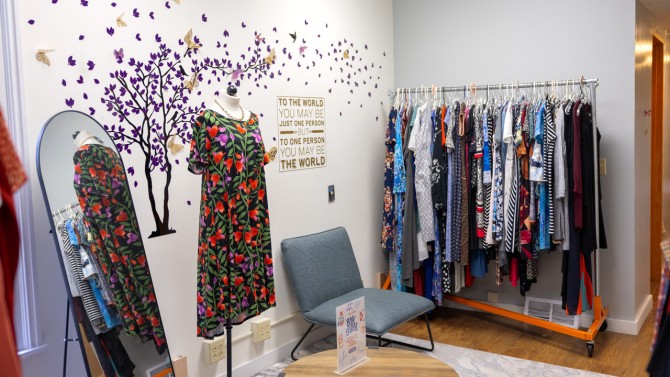Ronnise Way had been living in a family shelter in New York City for 10 months when she knew she wanted a better life for her and her children, then 3 and 7. She had fled to the shelter to escape domestic abuse. When her brother suggested she join him in Ithaca, she was nervous to leave the city. But she bought a one-way bus ticket.
"Me coming here, I was a little broken. I was closed off," Way said.
The Opportunity Boutique at the Women's Opportunity Center offers professional clothing for sale to the public and free clothing to clients. The center and boutique is located at 315 N. Tioga St. in Ithaca.
She found help at the Women's Opportunity Center, one of nearly 60 local agencies funded by the Cornell United Way campaign, now in its 104th year.
At the Opportunity Center, Way got free job training and professional clothing that she wore to her first job interview. "I was dressed to a T, and I did get the job," she said. "It makes a difference when you feel good about yourself."
The Cornell United Way campaign launched on Sept. 25, and is off to a strong start, with $115,300 raised as of Oct. 1. Cornellians can help strengthen their community by making a tax-deductible donation(online, via check or through payroll deduction) to United Way's United Tompkins Impact Fund to support local agencies, or an organization or cause of their choice.
Historically, Cornell contributions have provided around one-third of funds raised for the United Way of Tompkins County, said campaign co-chair Pat Wynn, assistant vice president of Student and Campus Life (SCL.)
In 2024, the Cornell contributions were even higher - providing 37.5%, or $473,011, of the total Tompkins County funds raised, $1,259,878. "This increase last year illustrates how crucial Cornell's campaign is to the well-being of our community," Wynn said.
But the percentage of Cornell employees participating has decreased recently. In 2022, 3.9% of Cornell employees gave; last year's campaign saw only 2.24% of the Cornell workforce contributing. Last year, employees gave $1,038 on average. "This illustrates that the engagement of more Cornellians at any level makes a greater community impact," said campaign co-chair Brandon Fortenberry, senior manager of dining training and development for SCL.
These contributions make a significant difference in the lives of people in the community, Ronnise Way said. She now has managed the Opportunity Center's Opportunity Boutique for eight years. The boutique is now located at 315 N. Tioga St. in Ithaca and is open to the public. The center, which serves men through the Medicaid 1115 waiver program, offers free entrepreneurship and job skills programs as well as referrals to local services from legal assistance to housing and child care. About 50% of clients are dealing with domestic abuse, she said.
Way recalled one client who had just been released from jail. "She was so happy to get new clothes that she cried," Way said. "A lot of these clients, they're so grateful for the little things that we're doing for them."
The Tompkins County United Way prioritizes funding for services in five areas: the United Way/211 ALICE (Asset-Limited Income-Constrained and Employed) Program, which provides a one-time $500 assistance for car repair, utilities and rent to households living below a sustainable income; food security; mental health; child and youth success; and safe, affordable housing. Last year, the program expended nearly $93,500 on behalf of ALICE households.
Professional clothing is sold to the public at the Opportunity Boutique at the Women's Opportunity Center, and is offered at no cost to the center's clients.
UW/211 ALICE helps keep people from losing their jobs for lack of transportation, dropping out of school for lack of internet service, or getting evicted and losing their housing, said John Mazzello, who administers the United Way/211 ALICE program.
"The thought is, how can we attempt to prevent a situation from getting worse, keep an unmet need from becoming multiple unmet needs," he said.
The program also refers people to other local services and resources. In the last fiscal year, it received 15,700 requests for assistance, Mazzello said, 85% from Tompkins County, and 10% from Cortland County, which is also in the United Way catchment area.
The program is running about 10% higher call volume than last year. "There's an elevated need more persistently," he said.
The top need in 2024 - about 30% of requests - was for housing. "That is up significantly," Mazzello said, "particularly things like rental assistance, eviction, utility payments."
These needs come at a time when local services are struggling to meet them, due to state and federal budget cuts, Mazzello said. "It's really important for donors to contribute to the services that help our community members, our neighbors. More local support means that there's less reliance on a state or federal grant, which might be more competitive or not available."
United Way funding for the 211/ALICE program has run out from the last two campaigns, and the program is currently helping only unhoused people who are transitioning to housing. Donations to the 2025-26 campaign will determine when the program can reopen full services, Wynn said.
"In these times, when funding for food security, children and youth programs and other essential services are seeing significant funding cuts," she said, "people who are able to contribute to the United Way can make a huge impact by giving back and assisting their friends and neighbors."








